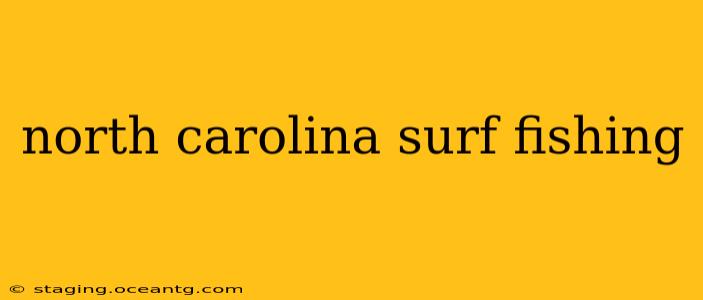North Carolina boasts a stunning coastline, offering some of the best surf fishing in the entire country. From the iconic Outer Banks to the more secluded southern beaches, anglers of all skill levels can find incredible opportunities to reel in a variety of species. This comprehensive guide will delve into the best spots, techniques, and species you can expect to encounter while surf fishing in North Carolina.
What are the best beaches in North Carolina for surf fishing?
This is a frequently asked question, and the answer depends on what you're hoping to catch! The Outer Banks (OBX) are undeniably popular, offering access to a wide range of species. Specific locations within the OBX like Hatteras Island, Cape Hatteras National Seashore, and Ocracoke Island are renowned hotspots. However, the beaches south of the Outer Banks, such as those near Wilmington and Carolina Beach, also offer excellent surf fishing opportunities, albeit with a slightly different species mix. Consider researching specific access points and piers for the best results, as conditions and species availability can vary greatly.
What is the best time of year to surf fish in North Carolina?
The best time to surf fish in North Carolina is generally during the spring and fall. These seasons offer pleasant weather, reduced crowds compared to the summer months, and peak activity for many fish species. Summer can also be good, but expect higher temperatures and more competition for fishing spots. Winter can produce some excellent catches, but colder temperatures and potentially rougher seas make it a more challenging time for surf fishing.
What kind of fish can I catch surf fishing in North Carolina?
North Carolina's surf offers a diverse range of species. Some of the most commonly caught include:
- Red Drum (Redfish): A prized game fish known for its strong fight.
- Speckled Trout: A delicious and challenging fish to catch.
- Bluefish: Aggressive and plentiful, particularly in the summer months.
- Black Drum: Another strong fighter, often found near structure.
- Flounder: A bottom-dwelling flatfish known for its camouflage abilities.
- Spanish Mackerel: Fast and agile, providing an exciting fight.
- Cobia: A powerful fish found near structure, often in the warmer months.
What equipment do I need for surf fishing in North Carolina?
Choosing the right equipment is crucial for a successful surf fishing trip. You'll need:
- A sturdy surf rod: Longer rods (8-12 feet) are ideal for casting far out into the surf.
- A strong fishing reel: Choose a reel with sufficient line capacity for long casts and battling large fish.
- Heavy-duty fishing line: Braided line is often preferred for its strength and sensitivity.
- Appropriate hooks and weights: These will depend on the target species and surf conditions.
- Terminal tackle: Swivels, sinkers, and leader material are essential.
- A variety of lures and bait: Live bait, such as mullet or shrimp, is often effective. Artificial lures like spoons, plugs, and jigs can also be successful.
What are some tips for successful surf fishing in North Carolina?
- Check the weather forecast: Surf conditions can change rapidly, so always check the forecast before you go.
- Understand the tides: High and low tides significantly impact fishing success.
- Choose the right bait or lure: Experiment to find what's working best on a given day.
- Learn to read the surf: Observe the waves and currents to identify likely fish-holding areas.
- Be patient: Surf fishing requires patience and persistence.
- Practice your casting technique: Accurate casting is vital for reaching productive fishing areas.
- Respect the environment: Practice catch and release for certain species and dispose of your trash properly.
What are some common mistakes to avoid when surf fishing in North Carolina?
Many beginners make mistakes that hinder their success. Common pitfalls include: using inadequate tackle for the species and conditions, neglecting to check weather and tide reports, poor casting technique, and not adapting your fishing strategy based on the day's conditions. Learning from experienced anglers or joining a guided fishing trip can help avoid these pitfalls.
Where can I find more information on North Carolina surf fishing regulations?
Before you embark on your fishing adventure, it’s vital to familiarize yourself with North Carolina's fishing regulations. The North Carolina Wildlife Resources Commission's website is an excellent resource for obtaining up-to-date information on licenses, bag limits, size restrictions, and other important rules and regulations. Ensuring you comply with these regulations is crucial for responsible and legal fishing practices.
This guide provides a starting point for your North Carolina surf fishing journey. Remember to research specific locations, study the tides, and most importantly, have fun! The Outer Banks and the rest of the North Carolina coast offer an unforgettable fishing experience.
